Planet Coaster Review
Planet Coaster
Is this the theme-park management sim we've all been waiting for?
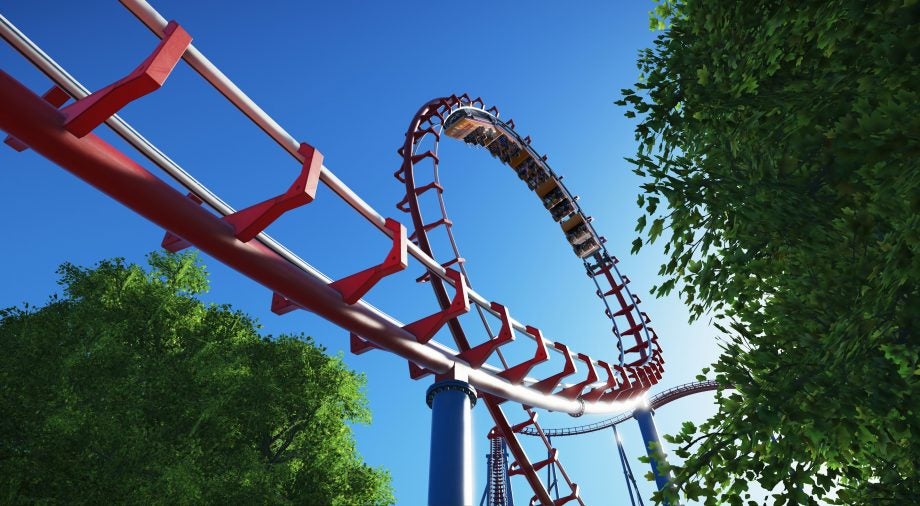
Verdict
Pros
- Fantastic ride line-up
- Superb build and customise tools
- Incredible range of scenery and props
- Brilliant fun to play
Cons
- Not a huge leap on from a management perspective
- Lacks a few classic rides and attractions
Available on PC
You might have thought it dead and gone forever, but the spirit of Theme Park and RollerCoaster Tycoon lives on in Frontier’s new, fantastic theme park simulator.
As someone who loved Theme Park, and wasted a worrying number of hours playing RCT, it’s a real delight to find a game that scratches the same itch. If you love constructing rides, if you love building your own versions of Disneyland, Six Flags Magic Mountain or Port Aventura, you’ll find Planet Coaster a thing of joy.
Up to a point, it’s utterly predictable, sticking to the same template that Bullfrog introduced with Theme Park, which provided the starting point for the more coaster-focused RCT and RCT2.
Related: All the best Black Friday Deals in the UK right now
Frontier, of course, adopted it for RCT3 and the more action-orientated Thrillville games, so it’s easy to see Planet Coaster’s spiritual lineage. You lay out paths, construct rides, trace out queue and exit paths. You build souvenir shops, burger stands, drink stalls and balloon stores.
It’s a beautiful piece of work, with gorgeous cartoon graphics, superb theme park audio and a cracking “keep busy” score, but in terms of the most basic gameplay and objectives, it’s surprising how little has moved on.
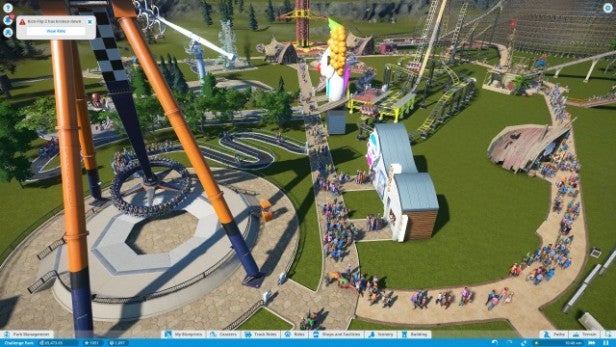
You try to make sure there are enough bins and toilets, and hire mechanics and janitors to keep your rides and pathways in good order. You work to keep your finances in order, investing wisely so that you can splash out on the game’s biggest draw; those awesome coasters.
And while you’re doing all this, you bend over backwards to keep your guests happy, building rides that will thrill them, scare them and leave them loving every minute. There aren’t many games where you’ll spend most of your time trying to put a smile on people’s faces, rather than a hole in their heads. Planet Coaster is one of the few.
If you know your Arrow from your Bolliger & Mabillard, your Hyper Coaster from your Floorless, you’ll be delighted with the lineup of coaster types available. However, where Planet Coaster goes beyond the classic sims is in the depths it goes to in terms of park customisation.
Sure, the tools for building rides and laying out the paths are intuitive and helpful, even prompting you to site the entrance and the exit, and ensure that the former connects to an open path before you open up.
The tools for laying out track rides, water rides and coasters are top-notch, making it easy to get a working layout, cram it with crazy loops, inline twists, cobra rolls and helixes, then tune it until you get it right.
But it’s in the theming and park decor that Planet Coaster really takes things further, allowing you to get more creative than ever before.
Related: Dishonored 2 review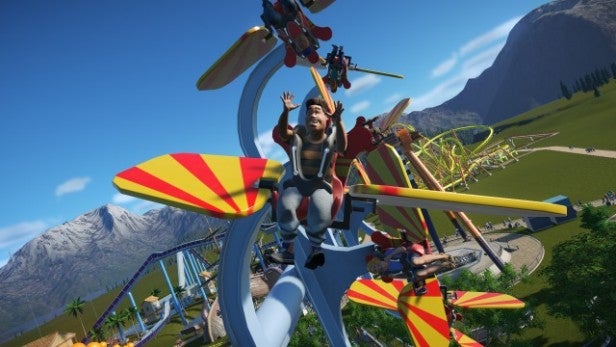
It isn’t a simple question of picking a ride and applying a theme or template. There’s a whole mass of scenery you can deploy in your park, with more becoming available through the game’s superb research tree. Plus, you can use it to build cool themed areas or even animatronic displays.
For example, if you want to build a Wild West wooden coaster, or turn a log flume into your own outdoor take on Pirates of the Caribbean, then you can. Why not build a sci-fi themed coaster with blaster battles, crashed spaceships and weird laser scanners, or a kiddie coaster with a fairyland theme?
You can use pre-made sets, such as a squad of pirate skirmishers or a monstrous kraken attacking a pirate ship; or build your own, prop by prop and element by element. You can add sound effects, lighting effects, water blasts, sudden plumes of flame, or showers of confetti. You can sculpt away at the landscapes, fill valleys with water, build coasters that tunnel through rock and soil. You’re free to let your imagination run riot.
And once you’re done, you can set your rides in motion and watch the live camera feeds taking it all in from a first-person viewpoint from any of the seats, or watch the faces of your guests as they journey through your latest white-knuckle thrill machine.
The better you do, the happier your guests; the happier your guests, the more money you’ll have to splash out on bigger, better rides and other attractions.
Get it wrong, and the result will be rides that six-year-olds snigger at, or those that terrify all but the most hardened inversion-loving teens – and you’d better pay your janitors well for all the sick they’ll be clearing up.
Related: Best PC games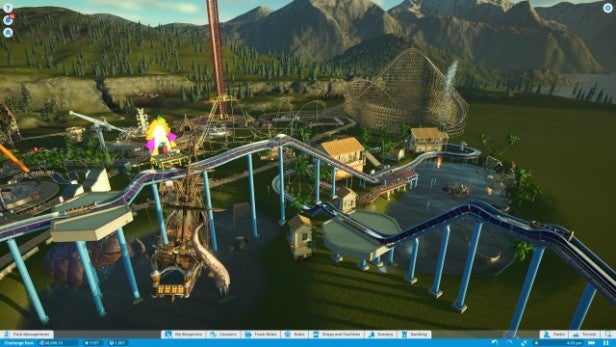
You can keep things simple, but there are always options to explore and operations to be tweaked, not to mention prices to be hiked or lowered. There are new shops, rides, coasters and scenery to be researched, plus newspaper, TV and viral marketing campaigns to be run.
Planet Coaster even plays smart by differentiating between family and teenage audiences: the former wanting rides on which they can take their kids; the latter hungering for the next intense adrenaline shot. Do you try to keep both groups happy, or simply focus on the one? It’s up to you.
I won’t tell you that Planet Coaster nails absolutely everything. It’s frustrating that you can’t just scale all types of scenery or easily build a wall around an area. The interface does its best to be simple and intuitive, but there are layers of staggering complexity – and you can’t help feeling that the video tutorials provided can’t cover everything, leaving a lot to be discovered through trial and error.
Following many hours of play, I’m still required to think hard about how I set up a work roster and then apply it to a mechanic to ensure that each patrols the rides I need maintained and repaired.
While the rollercoasters have a much-appreciated autocomplete option, the same can’t be said of all the track-based rides, and trying to finish up a log flume can be a nightmare. Editing track layouts, spline by spline, isn’t always as easy as laying them out in the first place, block by block.
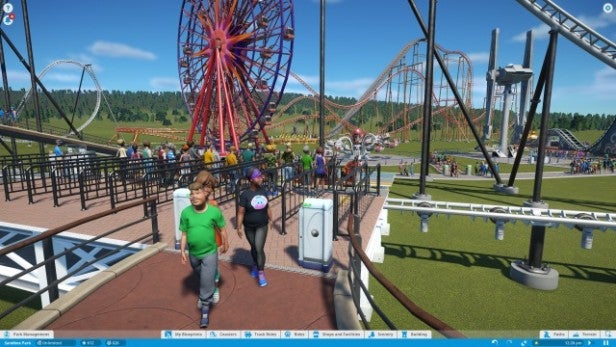
What’s more, there are some ways in which Planet Coaster doesn’t quite pull together as a game. You can play it in three ways.
First, there’s a challenge mode. Here you’re given a large plot of land and a starting budget, with the aim being to fulfil a few objectives while creating the best theme park you can. Second, there’s the career mode, where you build your skills and level by taking over a park in peril, meeting the conditions – there are three tiers per mission – then moving onto the next. Finally, you can play in open sandbox mode, with no problems and no costs involved; simply building the rides you want to build.
Career mode can be fun, but the parks can be limiting and the goals surprisingly unimaginative; build x rides, hire x mechanics, get x people in your park or earn x profits and you’re done. The best reason to do play through this mode is to grab ideas from some of the sillier scenarios and get to grips with the components of the game.
Sandbox is great if your thing is pure creation, but – for obvious reasons – the challenge goes awry, and there’s something a little hollow about simply plonking everything down, completely unearned.
Related: Watch Dogs 2 review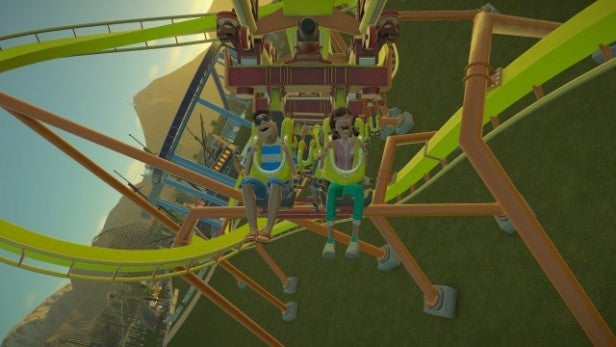
That leaves you with Challenge mode providing the most satisfying balance, giving you parks with space to expand out into and the satisfaction of building a business big enough to start researching and constructing the world’s greatest coasters.
Even here, though, there’s a feeling that Planet Coaster isn’t plumbing the same depths with its business simulation that it is with its park design – an area where RCT and RCT2 excelled.
What’s more, you’ll notice some weird phenomena that leave you wondering why a hat store that does storming business in one park fails hugely in another, despite an almost identical position; and why a certain corner goes uncleaned, even with multiple janitors are rostered to tackle it.
For some that might be a disappointment, and I’ll admit to feeling a little let down that some much-loved rides and attractions – haunted houses, 3D cinemas, cowboy shows, circuses and drop rides – seem to be MIA, at least at launch.
Yet I suspect that Frontier has long-term support plans for the game, and that with a very clever, creative community sharing blueprint kits, ready to build, a lot of what’s missing now will eventually come our way.
In the meantime, we’re left with one of the most enjoyable and creative sims I’ve had the pleasure to play for quite some years. It’s a game in which you’ll happily lose hours. Where a quick session just to polish off a coaster turns into a disastrous 3am finish all too easily. Be warned: Planet Coaster has RCT’s diabolical, mesmerising, sleep-depriving power and then some.
Verdict
If you’re looking for a theme park management game with a business perspective, Planet Coaster might leave you wanting. However, if you’re coming from the creative angle it’s hard to imagine a richer package.
Not only is it a joy to build and refine your rides and coasters, see people love them and design your perfect park, but the levels of detail in the theming, customisation and animatronics take the theme park sim to a whole new level.
If you ever wanted to build your own Thorpe Park or Cedar Point, this is the game for you.

